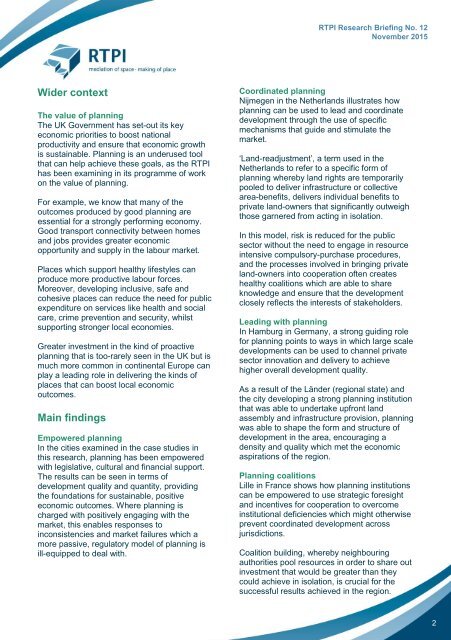rtpi_briefing_paper_12_planning_as_market_maker_november_2015
rtpi_briefing_paper_12_planning_as_market_maker_november_2015
rtpi_briefing_paper_12_planning_as_market_maker_november_2015
You also want an ePaper? Increase the reach of your titles
YUMPU automatically turns print PDFs into web optimized ePapers that Google loves.
RTPI Research Briefing No. <strong>12</strong><br />
November <strong>2015</strong><br />
Wider context<br />
The value of <strong>planning</strong><br />
The UK Government h<strong>as</strong> set-out its key<br />
economic priorities to boost national<br />
productivity and ensure that economic growth<br />
is sustainable. Planning is an underused tool<br />
that can help achieve these goals, <strong>as</strong> the RTPI<br />
h<strong>as</strong> been examining in its programme of work<br />
on the value of <strong>planning</strong>.<br />
For example, we know that many of the<br />
outcomes produced by good <strong>planning</strong> are<br />
essential for a strongly performing economy.<br />
Good transport connectivity between homes<br />
and jobs provides greater economic<br />
opportunity and supply in the labour <strong>market</strong>.<br />
Places which support healthy lifestyles can<br />
produce more productive labour forces.<br />
Moreover, developing inclusive, safe and<br />
cohesive places can reduce the need for public<br />
expenditure on services like health and social<br />
care, crime prevention and security, whilst<br />
supporting stronger local economies.<br />
Greater investment in the kind of proactive<br />
<strong>planning</strong> that is too-rarely seen in the UK but is<br />
much more common in continental Europe can<br />
play a leading role in delivering the kinds of<br />
places that can boost local economic<br />
outcomes.<br />
Main findings<br />
Empowered <strong>planning</strong><br />
In the cities examined in the c<strong>as</strong>e studies in<br />
this research, <strong>planning</strong> h<strong>as</strong> been empowered<br />
with legislative, cultural and financial support.<br />
The results can be seen in terms of<br />
development quality and quantity, providing<br />
the foundations for sustainable, positive<br />
economic outcomes. Where <strong>planning</strong> is<br />
charged with positively engaging with the<br />
<strong>market</strong>, this enables responses to<br />
inconsistencies and <strong>market</strong> failures which a<br />
more p<strong>as</strong>sive, regulatory model of <strong>planning</strong> is<br />
ill-equipped to deal with.<br />
Coordinated <strong>planning</strong><br />
Nijmegen in the Netherlands illustrates how<br />
<strong>planning</strong> can be used to lead and coordinate<br />
development through the use of specific<br />
mechanisms that guide and stimulate the<br />
<strong>market</strong>.<br />
‘Land-readjustment’, a term used in the<br />
Netherlands to refer to a specific form of<br />
<strong>planning</strong> whereby land rights are temporarily<br />
pooled to deliver infr<strong>as</strong>tructure or collective<br />
area-benefits, delivers individual benefits to<br />
private land-owners that significantly outweigh<br />
those garnered from acting in isolation.<br />
In this model, risk is reduced for the public<br />
sector without the need to engage in resource<br />
intensive compulsory-purch<strong>as</strong>e procedures,<br />
and the processes involved in bringing private<br />
land-owners into cooperation often creates<br />
healthy coalitions which are able to share<br />
knowledge and ensure that the development<br />
closely reflects the interests of stakeholders.<br />
Leading with <strong>planning</strong><br />
In Hamburg in Germany, a strong guiding role<br />
for <strong>planning</strong> points to ways in which large scale<br />
developments can be used to channel private<br />
sector innovation and delivery to achieve<br />
higher overall development quality.<br />
As a result of the Länder (regional state) and<br />
the city developing a strong <strong>planning</strong> institution<br />
that w<strong>as</strong> able to undertake upfront land<br />
<strong>as</strong>sembly and infr<strong>as</strong>tructure provision, <strong>planning</strong><br />
w<strong>as</strong> able to shape the form and structure of<br />
development in the area, encouraging a<br />
density and quality which met the economic<br />
<strong>as</strong>pirations of the region.<br />
Planning coalitions<br />
Lille in France shows how <strong>planning</strong> institutions<br />
can be empowered to use strategic foresight<br />
and incentives for cooperation to overcome<br />
institutional deficiencies which might otherwise<br />
prevent coordinated development across<br />
jurisdictions.<br />
Coalition building, whereby neighbouring<br />
authorities pool resources in order to share out<br />
investment that would be greater than they<br />
could achieve in isolation, is crucial for the<br />
successful results achieved in the region.<br />
2




